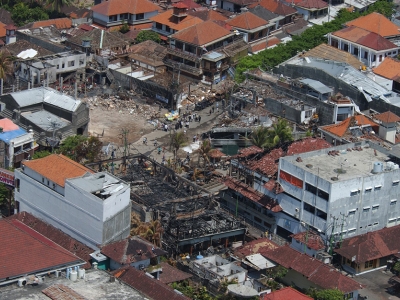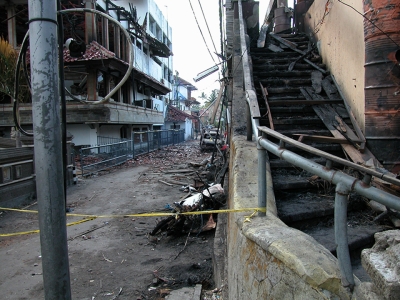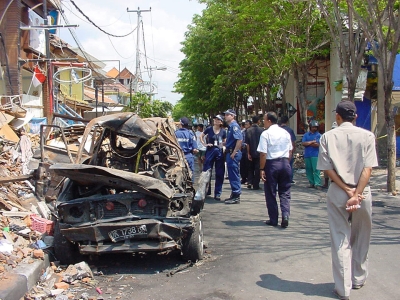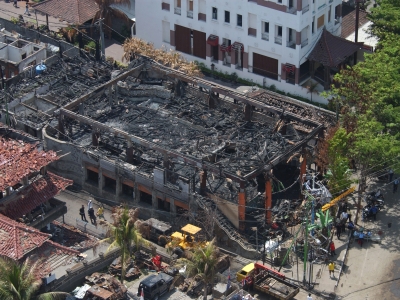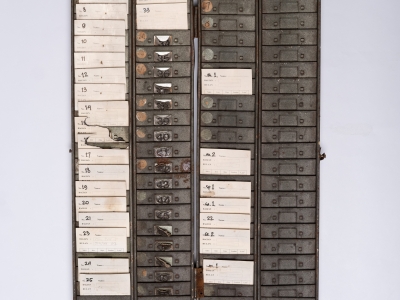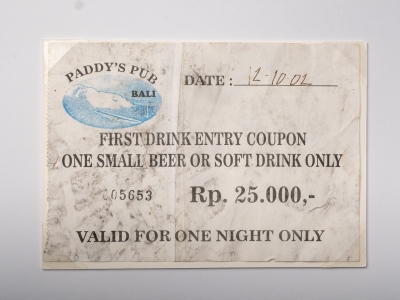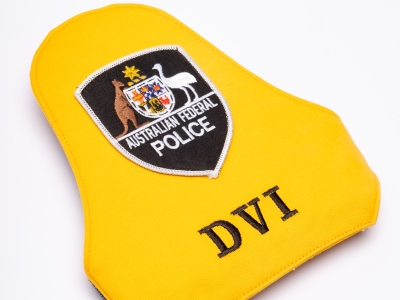Ray Martin: For many Australians, the 12th of October 2002 will be forever remembered as the date that terrorism darkened Australia's doorstep…
Frank Morgan: And it was just as I got back to the hotel, literally walked back into my room, when you heard the, the explosions, the… the noise of the bombs going off.
Glen McEwen: And all of a sudden, the lights went out. There was a loud boom, and the lights went out.
Ray Martin: Three separate explosions had rocked the popular tourist destination of Bali…
Sarah Benson: And I remember the phone, the phone ringing in the lab, which was unusual for a Sunday. And then the phone calls just kept going.
Mark Laing: I got up on Sunday morning to multitude of text messages and voice messages all concerning some of our colleagues that were actually in the Sari Club and had been victims of the bombing.
Nathan Green: It was one of those times where you just had a feeling that yesterday was no longer the same, it's changed, that something had fundamentally shifted in the world, that this was one of the first times that Australians were deliberately targeted offshore.
Ray Martin: I'm Ray Martin… and Operation Alliance: the 2002 Bali Bombings is an historic 4-part series that will take you inside the search for justice and the investigation by the Australian Federal Police and their Indonesian counterparts.
Graham Ashton: You know, the Indonesian forensic scientists, they're well-qualified people, and they had a lot of bombings on a regular basis at that time in Indonesia, you know, they weren't strangers to bombings.
Ray Martin: You'll hear first-hand accounts from those officers who helped the injured…
Frank Morgan: There was a guy driving past down the laneway in front of the hotel in a ute, so I basically commandeered his ute, put Tim in it, and as many injured people as I could and just said, "Get me to a hospital, get me somewhere, a medical centre".
Ray Martin: To forensic experts involved in the hunt for clues…
Annie Lam: We put a little heater in there and we made a super glue tent, and we found that to be successful. And then we developed fingerprints.
David Royds: Most people were looking at the floor, looked up, saw that ceiling, and it's almost impossible to ignore what was up there.
Ray Martin: And also, those helping the families of the victims.
Karl Kent: I think those of us that had to deal with that found that the most confronting. Feeling that loss first from the family members and then relating that to what was being done in the field.
Ray Martin: Operation Alliance is a story of extraordinary teamwork…
Ben McDevitt: For every person on the ground in Bali, there were at least 10 people back in Australia working to support those individuals, to supply them with the logistics, to enable them to operate safely you know in a foreign country and be able to support them.
Ray Martin: And a story that's shaped the AFP - and the men and women within it - like no other event in our history.
Graham Ashton: To be part of that and being able to capture those responsible and provide at least some, some outcome for families who had been through so much, felt very rewarding. But at the time, you felt like you were part of something significant, something historic, as to what was happening in terms of Australia's history.
Reece Kershaw: I think as a police officer first and a commissioner second, we did everything we could for the families and for those victims, and, and I believe we did bring those responsible to justice. But it's never ending, and we'll never give up and we'll never stop.
Ray Martin: Operation Alliance: the 2002 Bali Bombings – incredible first-hand stories from inside the AFP. Episode 1 is available to download from September 21 wherever you get your podcasts.


